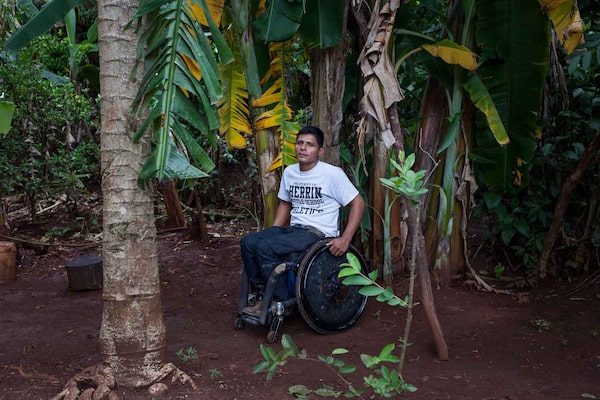Good evening,
WHAT YOU NEED TO KNOW
Jody Wilson-Raybould speaks to cabinet in confidential conversation
One day after Prime Minister Justin Trudeau’s top adviser resigned in the wake of the SNC-Lavalin affair, former veterans affairs minister Jody Wilson-Raybould spoke with cabinet. Mr. Trudeau said on his way into the House of Commons that she had asked to speak to cabinet, but he would not say what they discussed and stressed all cabinet conversations are confidential, The Canadian Press reported. Ms. Wilson-Raybould spoke with the media briefly after the cabinet meeting, and said she’s still talking to her lawyer about what she can and can’t say publicly about allegations she was under pressure to avert a criminal trial for Quebec engineering giant SNC-Lavalin.“I am still consulting with my legal counsel, as I think people can appreciate, or should appreciate, the rules and laws around privilege, around confidentiality, around my responsibility as a member of Parliament,” she said.

Liberal MP Jody Wilson-Raybould leaves the Parliament buildings following Question Period in Ottawa, Tues., Feb. 19, 2019.Adrian Wyld/The Canadian Press
Mr. Butts, who has been friends with Mr. Trudeau since university, resigned because of the continuing fallout of a Globe and Mail investigation two weeks ago that reported the Prime Minister’s Office put undue pressure on Ms. Wilson-Raybould, then-justice minister and attorney-general, to cut a deal with construction giant SNC-Lavalin, which would allow the company to avoid criminal prosecution.
For all of the background and context you need to understand the myriad threads, read our two explainers: What is the PMO, who works there and what does it do? and SNC-Lavalin, Jody Wilson-Raybould and Trudeau’s PMO: The story so far. They lay out why SNC-Lavalin is facing prosecution, what happened to Ms. Wilson-Raybould and how the PMO was involved and what the reaction has been so far.
Meanwhile, also today, a judge has thrown out charges against Stephane Roy, a former SNC-Lavalin executive facing charges of fraud over $5,000 and bribing a foreign public official in connection with the company’s dealings with the regime of the late Libyan dictator, Moammar Gadhafi. Quebec court Judge Patricia Compagnone concluded delays in his trial had become unreasonable.
Here’s the view from our opinion section:
John Ibbitson on how the billowing political smoke is obscuring the Liberals’ record: “The Liberals have a lot to take pride in: a raft of new trade agreements, progressive tax changes and child supports, major investments in infrastructure, a strong economy with low inflation and low unemployment. The smoke from the Wilson-Raybould fire obscures this record. Worse, the controversy threatens both the Liberals’ left and right flanks at the same time. …”
Globe editorial asks, why did Justin Trudeau cut off his right hand? “Mr. Butts was not only seen as the most powerful person in government and the chief string-puller behind the curtain; he was also believed to be indispensable to the PM, both as a policy wonk and a political strategist. He wasn’t just Mr. Trudeau’s right-hand man, he was understood as his right arm, or even the right half of his body. And now, just months before the election, he’s gone, or at least no longer running the show at the PMO.”
Adam Radwanski suggests nobody saw the Trudeau-Butts story ending this way and wonders is it really over? “The Liberals probably don’t know how any of this will work yet, themselves. In as much disbelief as anyone, they’re left to figure out how they’ve gone so badly off the rails, and whether the person who understood their journey as well as anyone can still be involved in helping them get back on track.”
This is the daily Evening Update newsletter. If you’re reading this on the web, or it was forwarded to you from someone else, you can sign up for Evening Update and more than 20 more Globe newsletters on our newsletter signup page.
‘We’re gonna win’: Bernie Sanders running for president in 2020
Describing his bid for the White House as a continuation of what he and his supporters achieved in 2016, Senator Bernie Sanders of Vermont, whose insurgent presidential campaign four years ago reshaped Democratic politics, announced he is running for president in 2020. As the Associated Press reports, the 77-year-old self-described democratic socialist said in an e-mail to supporters: “Our campaign is about transforming our country and creating a government based on the principles of economic, social, racial and environmental justice.”
Mr. Sanders embraces proposals ranging from Medicare for all to free college tuition, issues that have come to dominate Democratic politics in the era of Trump. The big challenge for him this time around is that his progressive and very left-leaning message is shared by many of the other candidates.
Columnist Lawrence Martin suggests that his age makes Mr. Sanders’ bid a long shot. “But given the large number of contenders who will divvy up the vote, the fact that he has a potent nationwide organization already in place and a big lead in fundraising means that capturing the Democratic nomination wouldn’t be out of the question.”
Seven Syrian refugee children die in early morning Halifax house fire
Seven children died early this morning in a fast-moving house fire in the Halifax neighbourhood of Spryfield. The children ranged in age from about three months to the mid-teens, according to a woman who lives next door, The Canadian Press reported. A man and woman who escaped the fire remained in hospital Tuesday afternoon, the man with life-threatening injuries. The woman was expected to survive. The family had fled the Syrian civil war and were refugees in Canada.

Medical charts plot the course where electrodes will be driven six centimetres into patient Serena Kelly's brain at Sunnybrook Health Sciences Centre in Toronto. She is part of a trial in which post-traumatic stress disorder is treated by deep stimulation of the brain.Melissa Tait
Pacemaker for the brain: An inside look at an experimental PTSD treatment
Roughly one in three patients with post-traumatic stress disorder (PTSD) do not respond to the standard treatments of drugs and psychotherapy. But a team of researchers in Toronto believes deep-brain stimulation, which is sometimes described as a pacemaker for the brain, may hold the key to their relief. As The Globe’s Wency Leung reports, the procedure involves drilling dime-sized holes in the patient’s skull and inserting two electrodes, which are powered by a battery pack implanted under the collarbone. By adjusting the electric pulses emitted by the electrodes, the researchers aim to regulate a brain circuit, called the limbic circuit, which involves multiple areas of the brain associated with PTSD symptoms.
MARKET WATCH
Canada’s main stock index inched higher on Tuesday, as shares of precious metal miners gained on the back of higher gold prices. The Toronto Stock Exchange’s S&P/TSX composite index was unofficially up 99.20 points, or 0.63 per cent, at 15,937.44. In New York, the Dow Jones Industrial Average rose 8.07 points, or 0.03 per cent, to 25,891.32, the S&P 500 gained 4.19 points, or 0.15 per cent, to 2,779.79 and the Nasdaq Composite added 14.36 points, or 0.19 per cent, to 7,486.77.
Got a news tip that you’d like us to look into? E-mail us at tips@globeandmail.com. Need to share documents securely? Reach out via SecureDrop.
ALSO ON OUR RADAR
- Chanel’s iconic couturier, Karl Lagerfeld, whose accomplished designs as well as trademark white ponytail, high starched collars and dark enigmatic glasses dominated high fashion for the past 50 years, has died.
- California-based streaming giant Netflix announced today it is expanding its presence in Canada by leasing two studio spaces along the downtown Toronto industrial waterfront area, which film and TV creators hope will provide new opportunities for local talent.
- A convoy of angry Albertans and other westerners rolls into Ottawa for a mass protest against federal energy and environmental policies that has also become a magnet for extremist, anti-immigrant elements.
- A coalition of 16 U.S. states led by California sued President Donald Trump and top members of his administration on Monday to block his decision to declare a national emergency to obtain funds for building a wall along the U.S.-Mexico border.
- The Alberta government announced plans to lease 4,400 rail cars to ship crude as the province continues to struggle with low oil prices and a lack of new pipeline capacity.
- According to a person familiar with the negotiations, The Associated Press says All-Star infielder Manny Machado has agreed to a $300-million, 10-year deal with the rebuilding San Diego Padres, the biggest contract to date for a free agent.
WHAT’S POPULAR WITH READERS

Tara Hardy/The Globe and Mail
Oscars 2019: One month inside this year’s terrible, horrible, no good, very bad Academy Awards race
The Globe’s Deputy Arts Editor and film critic Barry Hertz tracks the Academy Awards conversation from just before nominations were announced a month ago through the close of voting for the Oscars earlier this week, to offer his best prediction of which film will come out on top Sunday night. It’s a timeline of the ebb and flow of Oscar chatter, which can be pretty entertaining in and of itself.
TALKING POINTS
Ti-Anna Wang on how Canadians now know the truth about the ruthless Chinese government. “Behind the obvious disregard for human rights, such as the imprisonment of my father and the arbitrary detention of Michael Kovrig and Michael Spavor, there is a lesser known cost to the callousness of the Chinese government. In my case, it was the panic from being walked off a plane and detained by Chinese police; it was the stress of managing re-directed routes with a young baby, and the financial burden of changing itineraries. More significant was the crushing disappointment from not being able to see my father after so much anticipation, and the thought that my daughter may never be able to meet her grandfather.” Ti-Anna Wang is an articling student in Toronto
André Picard on taking aim at doctors who take a stand on gun control. “Canadian gun owners – or, more precisely, the small minority of National Rifle Association-wannabes who claim to speak for them – have a new target: Canadian Doctors for Protection from Guns, a group that has the audacity to say gun violence is a public health issue.”
Thomas Juneau examines our rocky relationship with Iran as the Islamic Republic turns 40. “Suspending relations may have felt like the right decision morally, but in practice it does not help in addressing consular cases, or human rights more generally, nor does it help the pursuit of Canada’s other interests. It stems from a fundamental misunderstanding of diplomacy: Its role is not only to reward friends, but also to deal with rivals.” Thomas Juneau is assistant professor at the University of Ottawa’s Graduate School of Public and International Affairs.
LIVING BETTER
ZACH WISE/The New York Times News Service
Should I feel guilty about trapping mice?
A reader ask David Eddie whether their 50-year-habit of setting traps for rodents every fall – and successfully snaring five or six whenever the weather turns and the critters go looking for warmer environs – is justifiable. David has a suggestion for this reader with a conscience, but you might not like it. Here’s a taste of David describing an experience from his past: “Frontier justice. If what ensued were portrayed in an old-timey cartoon, the sound effects might be: Blam blam! Kloon! Splort!”

Keenan Shoal/Todos Santos Eco Adventures
Island off the coast of Mexico’s Baja California Sur offers a glamping getaway to remember
It may be late to plan this year but this protected sea-lion colony in Baja California Sur looks like a tremendous future vacation. Writer Elizabeth Warkentin travelled by boat from her accommodations further down the coast of Isla Espiritu Santo to a small island in the Sea of Cortez about an hour’s boat ride from the Mexican city of La Paz. “The island itself is stunning, with towering cliffs in surreal shapes; white sand bays; awe-inducing lava rock formations; and rock art left by the extinct Guaycura and Pericu Indians,” she writes. Travellers stay at Camp Cecil, a sustainable glamping outfit that attracts nature and wildlife lovers looking to get off the grid (no WiFi or cellphone service here). It’s an opportunity to experience outdoor adventure, animal encounters and total relaxation – without having to truly rough it.
LONG READS FOR A LONG COMMUTE

German Chub, one the plaintiffs in one of the 3 canadian lawsuits against Hudbay, claimed he was shot by the mine security personal in 2009. He is paralyzed since then.Valerian Mazataud in collaboration with Sarah R. Champagne/The Globe and Mail
Canadian mines have wreaked havoc in developing countries for decades. Finally, there’s hope for a solution
Report on Business magazine’s March cover story is an informative look into how Indigenous communities in Latin America have been collateral damage in the violence surrounding Canadian-owned resource projects. Now, they’re bringing the fight for justice to Canada and, if they win, the repercussions will be massive. This photo-heavy feature highlights why Indigenous land claims, environmental standards and protection for human rights will become a much greater priority and how Canada’s mining companies might be hobbled, or helped, depending upon their approach to the new reality.
Evening Update is written by Michael Snider. If you’d like to receive this newsletter by e-mail every weekday evening, go here to sign up. If you have any feedback, send us a note.